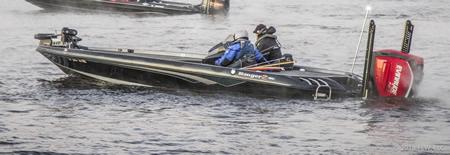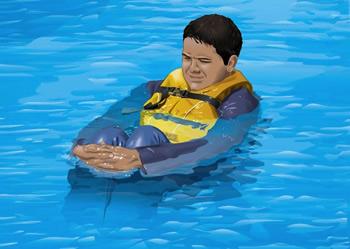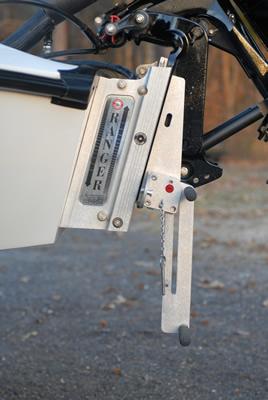January 18, 2018 - Accident brings focus to the potential dangers of wintertime angling, boating

A tragic boating accident that occurred on Jan. 4 at Florida's Lake Okeechobee should serve as a grim reminder to boaters and anglers everywhere as to how quickly a fun day fishing can turn into a nightmare when chilly weather sets in on really big water.
The accident took place during the opening round of the first Costa FLW Series Southeastern Division bass tournament of the 2018 season, sending shockwaves throughout the fishing community while grabbing the attention of watermen everywhere.
Originally slated for three days, the tournament was cut short after two of the competitors - Bill Kisiah of Slidell, La., and Nicolas "Nik" Kayler of Apopka, Fla. - failed to make it back to the designated weigh-in site where the remainder of the 250-plus boat field gathered to weigh their catches at the end of the first competition day.
Kisiah was competing in the pro/boater division while Kayler was competing as a co-angler. The two men were paired to fish together by random computer draw during the pre-tournament registration meeting held the evening before.
Often heralded as The Sunshine State, Florida turned windy and unseasonably airish during the days leading up to the tournament as gusty winds ushered in a strong cold front that dropped outside temperatures near the freezing mark in much of the state. Spanning 730 square miles with an average depth of nine feet, Okeechobee is a massive water body that can turn into a frothy sea of white-capping rollers under the right conditions.
The details about what happened out there remained sketchy at press time, but according to palmbeachpost.com reports, it is believed that Kisiah's 21-foot Ranger bass boat encountered rough water and speared a wave that ejected Kayler from the vessel, tossing him into the chilly water miles from shore.
The newspaper report indicates Kisiah subsequently lost power to his outboard engine and was unable to recover Kayler from the water. Kisiah was located by search parties hours later when he and his boat came ashore about 11 p.m. near Pahokee Marina. Kayler, meanwhile, was nowhere to be found.
Kisiah was taken to a local hospital and treated for hypothermia, a potentially dangerous condition resulting from a significant drop in body temperature caused by prolonged exposure to cold temperatures. He has since been released, according to the newspaper. An FLW photo of the two anglers before takeoff shows that both men were wearing lifejackets, as required by tournament rules.
FLW initially cancelled Day 2 of the event to aid in the search for the two anglers. The final tournament day was subsequently cancelled after early search efforts to locate Kayler were unsuccessful.
Despite intense search efforts involving the Florida Fish and Wildlife Conservation Commission, the U.S. Coast Guard, numerous law enforcement agencies and hundreds of local fishermen and boaters, there were no signs of Kayler until searchers recovered his body on the morning of Jan. 10, nearly a week after he went missing.
Thankfully, accidents like this one don't happen very often. But when they do it always spurs a wake-up call to remind everyone from recreational boaters to fishermen and hunters of the inherent dangers and risks associated with spending time outdoors during the winter months, especially when there are boats and water involved.
 While cold water doesn't pose much risk to anyone so long as they are able to stay dry, that is not the case if you happen to fall into the water unexpectedly. Simply bumping a stump with the boat or a sudden shift of the vessel created by wave action is all it takes to make a person momentarily lose their balance and fall overboard.
While cold water doesn't pose much risk to anyone so long as they are able to stay dry, that is not the case if you happen to fall into the water unexpectedly. Simply bumping a stump with the boat or a sudden shift of the vessel created by wave action is all it takes to make a person momentarily lose their balance and fall overboard.
Either way, taking a tumble into chilly water can be a shocker. It also can also be fatal, especially if you are unable reenter the boat promptly. Cold ambient (air) temperatures can complicate matters even more.
Probably the greatest danger facing anglers and boaters who take an unexpected dip into icy water water is an illness known as hypothermia.
Hypothermia is sometimes referred to as "the silent killer" because it causes individuals suffering from it to gradually lose their motor skills and become fatigued or exhausted. It can eventually cause a victim to become groggy or fall unconscious, which could lead to drowning, even when wearing a lifejacket.
As earlier mentioned, the main cause of hypothermia is overexposure to a cold environment. It occurs when a person loses body heat faster than they are able to produce it. While cold air alone can cause hypothermia, exposure to cold water can accelerate the process up to 25 times faster.
The textbooks define hypothermia as a drop in the temperature of the body's internal organs such as the heart, lungs and brain. Normal "core" body temperature is 98.6 degrees. Symptoms of hypothermia become evident once the "core" temperature drops below 95 degrees.
Early signs of the illness include the loss of motor skills, numbness of the body or nausea. A hypothermia victim may eventually begin to shiver uncontrollably, develop pale skin, have difficulty speaking or become incoherent as to what is going on around them. A person who develops hypothermia while immersed in water could eventually fall asleep or experience heart or respiratory failure.
Drowning is a common occurrence when hypothermia progresses to the latter stages. While a lifejacket will prevent you from drowning initially, it can't stop you from going face down in the water should you happen to fall unconscious. Though drowning is a common denominator in boat-related deaths, experts believe the ultimate cause in many wintertime drownings is probably hypothermia.

This holds especially true of victims who venture out alone and fall into the water unexpectedly. Some are able to reenter their boat without assistance. Others are not.
I fish a lot by myself and I keep two ladders on my boat at all times for this very reason. One is made from aluminum and bolts onto the transom. The other is made from heavy duty nylon rope. The three-step rope ladder rolls up and secures to a cleat near the bow.
I've never had to use either ladder, but it's good to know they are there in case the need ever arises.
Naturally, the likelihood of hypothermia taking hold when a person is immersed in water hinges largely on how cold the water is. The survival time in 32 degree water is about 45 minutes; exhaustion, 15 minutes or less. Survival time in 40-50 degree water is only 1-3 hours; exhaustion sets in within an hour. Survival time in 50-60 degree water is 1-6 hours; exhaustion, 1-2 hours.
Matt Williams is a freelance writer based in Nacogdoches. He can be reached by e-mail, mattwillwrite4u@yahoo.com.









